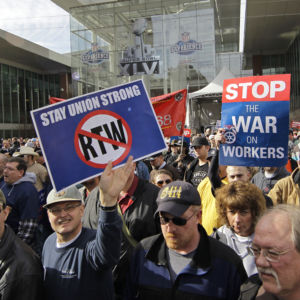A federal appeals court heard arguments on whether to allow local right-to-work ordinances Tuesday in a case that could have national implications.
Lincolnshire, Illinois, became the only locality in the state to enact its own right-to-work ordinance in December 2015. The village has since been wrapped up in a legal battle over whether localities have the authority to enact such laws. The Seventh Circuit Court of Appeals heard arguments in the case Tuesday.
AFL-CIO affiliated local unions filed the lawsuit against the right-to-work ordinance. They argue that only states have the authority to pass right-to-work laws. The Liberty Justice Center (LJC) is helping the village fight back against the legal challenge – arguing that federal law doesn’t explicitly forbid localities from enacting the policy.
“Illinois as a whole isn’t right-to-work but there is no law saying localities can’t enact their own right-to-work laws,” LJC attorney Jacob Huebert told InsideSources. “And municipalities have strong home rule powers so under state law they can do this. But then after they enacted this law the unions sued.”
Home rule statutes allow municipalities to pass their own economic development laws so long as it doesn’t interfere with existing state law. Huebert argues localities are therefore free to enact their own right-to-work ordinances since there is no state law banning it.
District Court Judge Matthew Kennelly ruled that only states have the power to enact right-to-work laws after hearing the case in January 2017. Lincolnshire appealed the decision to the circuit court of appeals. A ruling in favor of the village could potentially open the floodgates for even more local right-to-work ordinances.
“If we win in this case that will mean that home rule governments across Illinois will be free to enact their own right-to-work ordinances,” Huebert said. “Then presumably, if we prevail here, that will also encourage more local right-to-work efforts in other states.”
Huebert adds that he suspects a lot of municipalities will want to pass their own laws to compete with neighboring states that already have it. Those in support of right-to-work regularly argue that the policy attracts businesses and jobs while also upholding worker freedom.
Kentucky became an early battleground for the policy fight when a handful of counties in the state passed right-to-work ordinances. Warren became the first county in the country to enact the law back in December 2014. The Sixth Circuit Court of Appeals eventually upheld the policy during a union brought lawsuit.
“If the Seventh Circuit doesn’t rule in our favor then we would presumably try to take it to the U.S. Supreme Court,” Huebert said. “It might be a good candidate for the Supreme Court to take up because there would be a split between the Sixth Circuit and Seventh Circuit. The Supreme Court often takes cases because they want to resolve a split like that.”
Democrats and labor unions tend to be highly opposed to right-to-work laws. They contest the policy is merely an underhanded way of hurting unions and the workers they represent. The local ordinances have also been facing fierce opposition from the left. Illinois Attorney General Lisa Madigan called local right-to-work illegal.
The International Union of Operating Engineers Locals 150 and 399, the Laborers District Council of Chicago, and the Chicago Regional Council of Carpenters are the main local unions behind the lawsuit.

